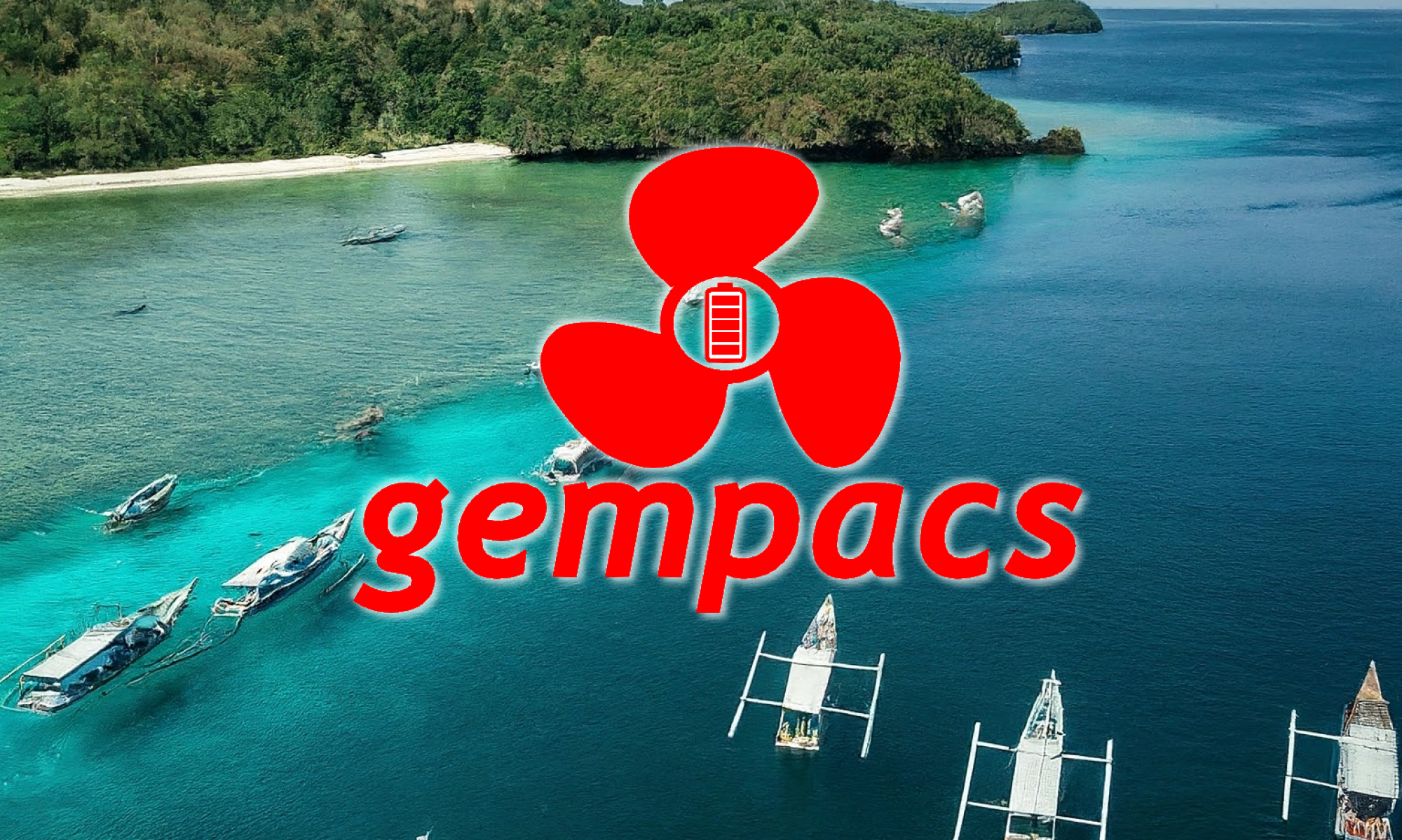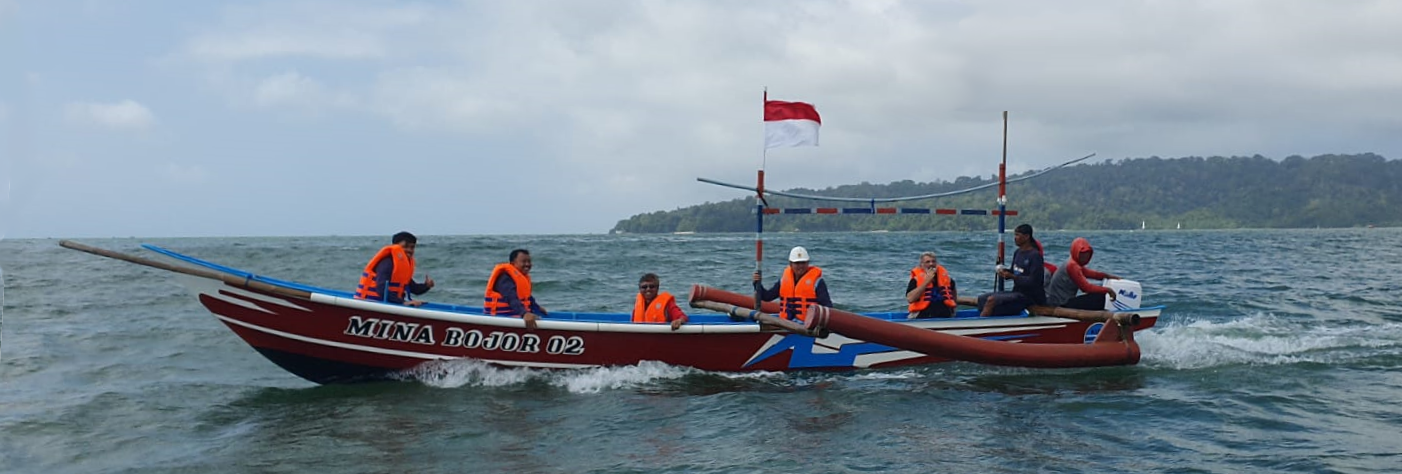I would like to tell you a story that comes from a distant but wonderful country.
It is a story of poor but kind and big-hearted people, a story that I have been experiencing very closely for a few years now and which is repeated every day for millions of people.
Pak Eko, an Indonesian fisherman with a face marked by the sun and wind, checks his two-stroke outboard motor.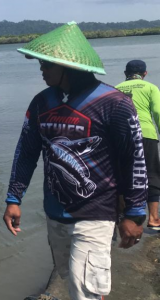
A sigh accompanies his gaze: the fuel is almost finished and the day of fishing is still long. His boat, powered by an old two-stroke engine that spews blue smoke and a pungent smell, had to move slowly, he was running out of petrol which, for someone like him, who lived from the sea was normal. A sigh of concern escapes him: petrol is running low and the day’s catch is still uncertain. His family depends on him, but life as a fisherman is hard. Fuel is a fixed cost, a debt that imprisons him in a vicious circle of poverty. Gasoline, subsidized
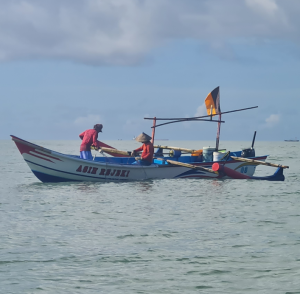
by the government but limited to $20 a day, represents a huge expense for Pak Eko, as well as many other Indonesian fishermen like him. Indebtedness is a plague that oppresses them, with a paltry salary of 12 or 13 dollars a day it is a chain that ties them to speculation and poverty.
Pak Eko is up to his neck in debt. He had to buy his boat on credit, and every day he has to pay for gas and ice to store the fish. If the catch is poor, he is unable to repay his debts and risks losing his boat, his family’s only source of livelihood. Every day he carries the outboard motor weighing over forty kilograms on his shoulder and travels the two kilometers that separate his very modest but decorous house from the beach where his boat is located. Along the way he doesn’t feel the weight of the engine, but rather the weight of debts and uncertainty.
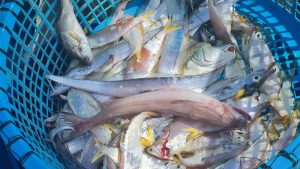 Pak Eko’s life is a daily struggle against poverty and precariousness. He works hard, but the system is against him, he is thirty-five years old but looks ten years older, he has noticed that his hearing is no longer what it used to be and he increasingly feels pain in the arm he uses to steer the boat. He also just learned that the Indonesian government is considering reducing fuel subsidies over the next few years and this worries him even more than the health problems.
Pak Eko’s life is a daily struggle against poverty and precariousness. He works hard, but the system is against him, he is thirty-five years old but looks ten years older, he has noticed that his hearing is no longer what it used to be and he increasingly feels pain in the arm he uses to steer the boat. He also just learned that the Indonesian government is considering reducing fuel subsidies over the next few years and this worries him even more than the health problems.
But a spark of hope is about to illuminate his horizon. A new pilot project offers fishermen like him access to microcredit to purchase electric outboard motors and batteries. The idea is simple: replace polluting and expensive engines with silent and thrifty electric engines and with access to microcredit he does not have to advance a sum of money that is unattainable for him. The cost of electricity is five times lower than that of petrol, so daily savings allow you to repay the loan in a short time, freeing you from debt slavery, eliminating the need to pay for fuel in advance, because electricity is paid monthly.
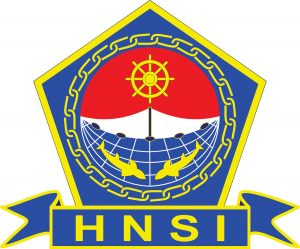 HNSI, his fishing cooperative, told him about the new pilot project taking place in Cilacap, his town in Java, facing the Indian Ocean. Pak Eko is hesitant at first, some friends who already own an electric motorbike scared him, telling him about very little autonomy, little power and even the risk of fire or explosion of the batteries, but the potential saving on petrol attracts him , as well as access to microcredit.
HNSI, his fishing cooperative, told him about the new pilot project taking place in Cilacap, his town in Java, facing the Indian Ocean. Pak Eko is hesitant at first, some friends who already own an electric motorbike scared him, telling him about very little autonomy, little power and even the risk of fire or explosion of the batteries, but the potential saving on petrol attracts him , as well as access to microcredit.
Thanks to the reassurances of the eldest son, who spoke with the technicians of PLN, the Indonesian electricity company where he is the guardian, who arrived in large numbers from Jakarta, together with an Italian “bule”, for the launch event of the pilot project, and they told him that the technology is safe and works well, although it is in an experimental phase.
Pak Eko thought: “If even a bule , coming from the other end of the world, arrives here to Cilacap, together with many “big shots” with black cars, with television, journalists and the inevitable entourage of politicians, perhaps the thing it really works and it’s also important…”
With the support of his family he therefore decides to take the big step and turns to his fishermen’s cooperative, where they explain to him all the economic advantages of the initiative, they tell him that being a senior and very participatory member, he could easily be chosen to receive one of the electric boats of the pilot project, sponsored by PLN, for free.
After a few months and a few kilos of lobsters, given to those in charge, Pak Eko receives the news that he has been chosen to participate in the pilot project and receives a complete kit to equip his boat and electrify it, and even two technicians arrive from Jakarta to help him in the installation and train him in using the engine and charging the batteries. Indeed, PLN increases the power limit of the home electricity meter, from 0.5 kW to 4k, maintaining the same tariff. Now, if only he could afford it, he could even run an air conditioner in his house. When he then discovers that the top-up service includes the National Health Service payment for the whole family, which he hadn’t been able to pay for years, his joy goes through the roof and he really begins to see the light at the end of the tunnel.
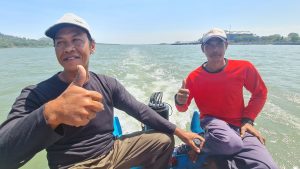 The first weeks are about discovery. Learn to manage the new engine, know the tricks to optimize autonomy and charging. The cooperative community becomes a collective learning laboratory. The initial distrust turns into enthusiasm when the first results become evident.
The first weeks are about discovery. Learn to manage the new engine, know the tricks to optimize autonomy and charging. The cooperative community becomes a collective learning laboratory. The initial distrust turns into enthusiasm when the first results become evident.
The savings on petrol are tangible. Instead of 20 dollars a day, Pak Eko spends only 3. His monthly income increases considerably, doubling in the space of a few days. He can finally afford a refrigerator to preserve fish, a gas stove to cook and send his children to school for longer, his wife can dedicate herself more actively to the marketing of fish, stopping doing odd jobs, guaranteeing, overall, a better future for the whole family.
 Pak Eko’s life changes radically. Not only did his income increase, but his health improved. No more harmful gases to breathe, no more deafening engine noise, no vibrations and what’s more, the electric motor offers better performance compared to the old combustion engine. Finally, thanks to the IoT-Mesh tracking system integrated into the engine, the sea becomes a safer place. Technology becomes an ally: the network connection of the boats allows the position and activity status of the fishermen to be monitored, as well as the bidirectional sending of safety and weather alarms, improving safety at sea. Communication thus becomes easier, encouraging collaboration and the exchange of information. Illegal fishing decreases, the marine environment regenerates and new technologies open up new possibilities.
Pak Eko’s life changes radically. Not only did his income increase, but his health improved. No more harmful gases to breathe, no more deafening engine noise, no vibrations and what’s more, the electric motor offers better performance compared to the old combustion engine. Finally, thanks to the IoT-Mesh tracking system integrated into the engine, the sea becomes a safer place. Technology becomes an ally: the network connection of the boats allows the position and activity status of the fishermen to be monitored, as well as the bidirectional sending of safety and weather alarms, improving safety at sea. Communication thus becomes easier, encouraging collaboration and the exchange of information. Illegal fishing decreases, the marine environment regenerates and new technologies open up new possibilities.
The spark turned into a beacon for the future. A future of cleaner seas, more prosperous fishermen and coastal communities finally able to flourish.
The story of Pak Eko can be the story of millions of Indonesian fishermen. A story of hope, redemption and a sustainable future.
Pak Eko’s story must not be an isolated case. The spread of electric propulsion in Indonesian coastal communities can create a domino effect of development, with a tangible impact, not only in relation to climate change, but also and even more so in the fight against marine pollution, against illegal fishing and against the destruction of the marine environment.
